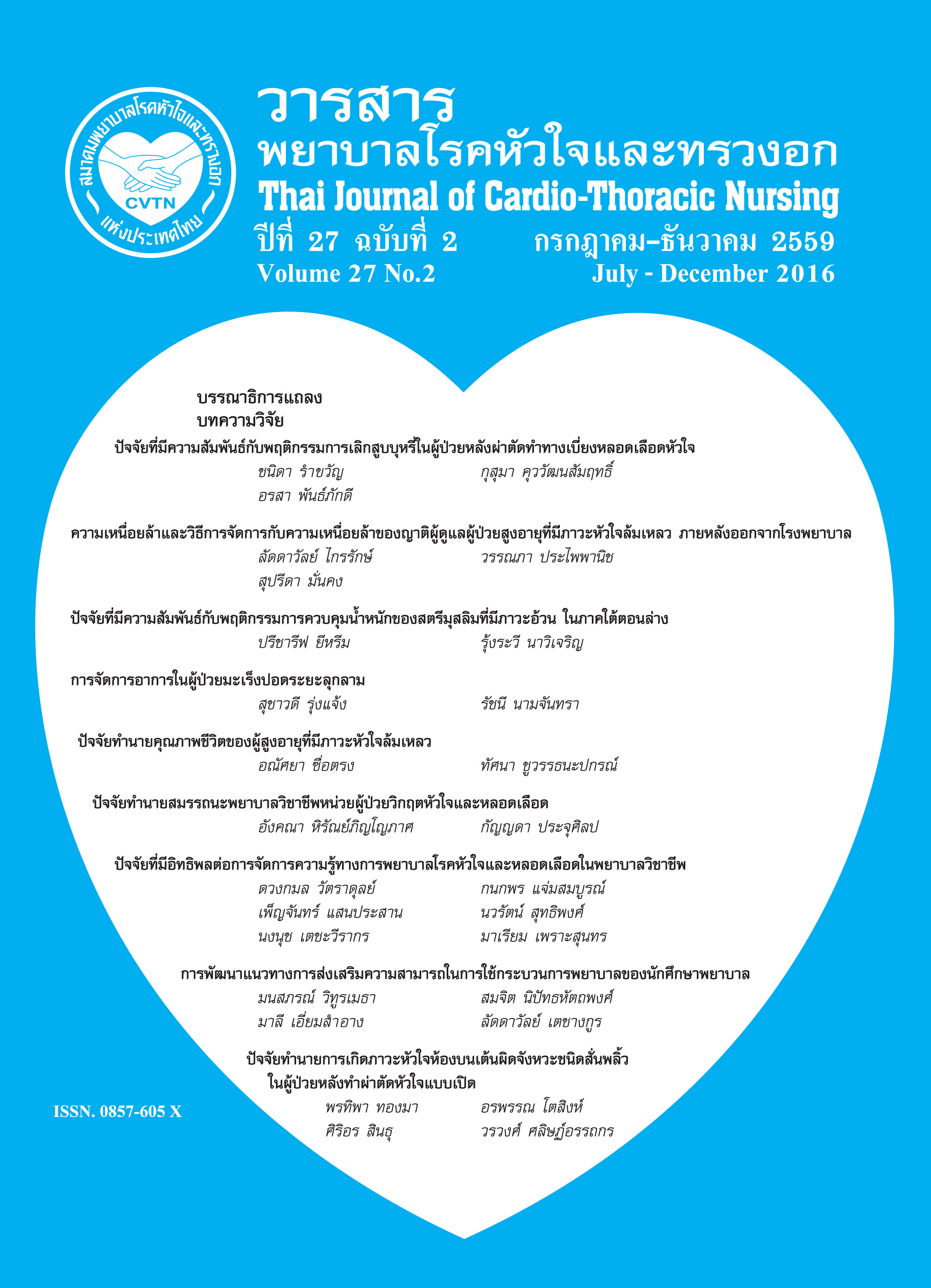การจัดการอาการในผู้ป่วยมะเร็งปอดระยะลุกลาม
Keywords:
ผู้ป่วยมะเร็งปอดระยะลุกลาม, อาการ, วิธีการจัดการอาการ, ผลลัพธ์, advanced lung cancer, symptoms, symptom management strategies, outcomesAbstract
การวิจัยเชิงบรรยายนี้ มีวัตถุประสงค์เพื่อศึกษา 1) อาการ และความรุนแรงของอาการในผู้ป่วยมะเร็งปอดระยะลุกลาม และ 2) วิธีการจัดการอาการ และผลลัพธ์ของการจัดการอาการในผู้ป่วยมะเร็งปอดระยะลุกลาม กลุ่มตัวอย่างเลือกอย่างเฉพาะเจาะจงจากผู้ป่วยมะเร็งปอดระยะลุกลามที่มารับบริการ ณ หน่วยผู้ป่วยนอก โรงพยาบาลจุฬาภรณ์ จำนวน 83 คน เก็บรวบรวมข้อมูลโดยใช้แบบบันทึกข้อมูลส่วนบุคคล แบบบันทึกข้อมูลเกี่ยวกับความเจ็บป่วย และแบบสัมภาษณ์อาการ ความรุนแรงของอาการ วิธีการจัดการอาการ และผลลัพธ์ของการจัดการอาการ วิเคราะห์ข้อมูลโดยใช้สถิติเชิงบรรยาย และการวิเคราะห์เชิงเนื้อหา
ผลการวิจัย พบว่า อาการที่พบบ่อย 5 อันดับแรก ได้แก่ ปวด ไอ เหนื่อยล้า หายใจลำบาก และเบื่ออาหาร เรียงลำดับตามความรุนแรงในอาการที่พบบ่อยได้เป็น เบื่ออาหาร ปวด เหนื่อยล้า หายใจลำบาก และไอ ตามลำดับ โดยอาการปวดเป็นอาการที่พบบ่อยที่สุด ในขณะที่อาการเบื่ออาหารมีค่าเฉลี่ยความรุนแรงสูงที่สุด ผู้ป่วยมะเร็งปอดระยะลุกลามใช้วิธีการหลายๆ วิธีในการจัดการอาการแต่ละอาการ วิธีการจัดการอาการที่พบบ่อย 5 อันดับแรก มีดังนี้ 1) อาการปวด ใช้วิธีการรับประทานยาแก้ปวดทุกครั้งที่มีอาการ 2) อาการไอ ใช้วิธีจิบน้ำอุ่น/ดื่มน้ำ และรับประทานยาละลายเสมหะ 3) อาการเหนื่อยล้า ใช้วิธีการนั่งพัก/นอนพักช่วงกลางวัน 4) อาการหายใจลำบาก ใช้วิธีการนั่งพัก/นอนพัก และ 5) อาการเบื่ออาหาร ใช้วิธีการปรับเปลี่ยนพฤติกรรมการรับประทานอาหาร เช่น รับประทานอาหารหรือผลไม้ที่มีรสเปรี้ยว หรือดื่มเครื่องดื่มอาหารเสริมระหว่างมื้ออาหาร ผลลัพธ์ของการจัดการอาการของผู้ป่วยโดยรวมเป็นไปในทางที่ดี คือ มีอาการทุเลา
ผลการศึกษานี้เป็นข้อมูลในการวางแผนการพยาบาลผู้ป่วยมะเร็งปอดระยะลุกลาม เพื่อลดความรุนแรงและบรรเทาอาการจากโรค ในการให้ข้อมูล ให้คำปรึกษา รวมทั้งสนับสนุนให้ผู้ป่วยและญาติมีการจัดการอาการด้วยตนเองให้สอดคล้องกับความต้องการในการดำเนินชีวิตประจำวัน เพื่อคุณภาพชีวิตที่ดีของผู้ป่วยมะเร็งปอดระยะลุกลาม
Symptom management in patients with advanced lung cancer
This descriptive study aimed to describe 1) symptoms and severity of the symptoms in advanced lung cancer patients, and 2) symptom management strategies and outcomes in those with advanced lung cancer. The sample included 83 patients with advanced lung cancer who were purposively selected from those attending at the outpatient department of Chulabhorn Hospital. Data was collected by using 1) personal data form, 2) medical record form, and 3) interview questionnaire about symptoms, severity of the symptoms, symptom management strategies, and outcomes. Data were analyzed using descriptive statistics and content analysis.
The results showed that the five most frequently found symptoms consisted of pain, cough, fatigue, dyspnea, and loss appetite. On the order of the severity among these common symptoms were loss of appetite, pain, fatigue, dyspnea, and cough respectively. Pain is the most noticed symptom; nonetheless, loss of appetite yielded highest level of average severity. Meanwhile, the management of symptoms among the sample varied on each symptom. Their first 5 common symptom management strategies were: 1) taking painkillers for pain, 2) sipping of warm/regular water for cough and taking mucolytic drugs, 3) resting/sleeping during the day when having fatigue, 4) resting/sleeping while having dyspnea, and 5) changing eating habits when losing appetite such as eating sour fruits or foods and food supplement beverage between the meal. The outcomes revealed a relief of symptom in overall patients.
The results of the study could be used for developing a nursing care plan for patients with advanced lung cancer to decrease the severity of the symptoms and relieve them. This includes the provision of appropriate information, consultation, and support for the patients and their relatives towards self-symptom management according to their routine lifestyles so as to improve quality of life among advanced lung cancer patients.
Downloads
How to Cite
Issue
Section
License
บทความนี้ยังไม่เคยตีพิมพ์หรืออยู่ในระหว่างส่งไปตีพิมพ์ในวารสารอื่น ๆ มาก่อน และกองบรรณาธิการขอสงวนสิทธิ์ในการตรวจทาน และแก้ไขต้นฉบับตามเกณฑ์ของวารสาร ในกรณีที่เรื่องของท่านได้ได้รับการตีพิมพ์ในวารสารฉบับนี้ถือว่าเป็น ลิขสิทธิ์ของวารสารพยาบาลโรคหัวใจและทรวงอก






